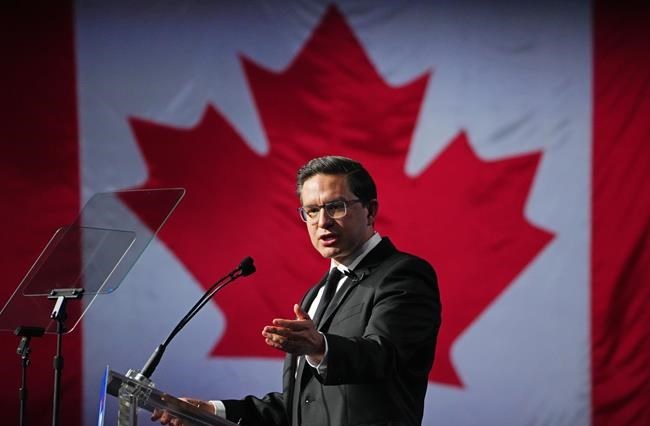OTTAWA — Pierre Poilievre is waking up today as the new leader of the Conservative party, coming off a landslide win.
Before he can take time to enjoy the victory, he has a list of things to do.
The House of Commons is set to resume sitting in nine days, meaning Poilievre and his inner circle have to decide who will fill the party's critic roles.
Poilievre has no shortage of names to pick from, given that 62 out of the party's 118 members of Parliament chose to back him in the leadership campaign.
He must also decide where to place the MPs who were former leadership rivals: Scott Aitchison and Leslyn Lewis.
The Conservative caucus is also expected to meet on Monday, where Poilievre and the MPs he leads — including those who did not back him in the contest — will hammer out their priorities for the fall.
Saturday's leadership election results show that Poilievre didn't just win big, but really big.
A detailed breakdown of the results shows he won nearly all of the country's 338 ridings, including most of the ones in Quebec.
That would be a disappointment to the province's former premier Jean Charest, who was Poilievre's main rival in the race.
Charest announced in a video Sunday morning that he plans on returning to the private sector, adding it's time to unite behind a new leader.
"I will continue to be active within the party," he said. "I will continue to be a member of the party and I will continue to fight for the ideas that I put forward."
Those ideas included championing the rule of law when it came to last winter's so-called truckers' convoy that shutdown parts of the downtown Ottawa for weeks. During the race, Charest had criticized Poilievre for embracing the protest, saying he can't be taken seriously as a lawmaker because he supported an illegal blockade.
In an opinion piece published Sunday in the National Post, former campaign co-chair Mike Coates said Charest will not run in the next federal election and poured water on the idea those on his leadership campaign are at all interested in forming their own party after losing to Poilievre.
Poilievre's support for the truckers' convoy had worried some about his planned direction for the party, prompting speculation that his victory could see centrists and progressives in the party seek another option.
"The membership has spoken," Coates wrote. "It is time for partisans to do what we do best: Unite."
Another candidate reckoning with Saturday's results is Lewis. She earnedonly about nine per cent of support this time after blowing past expectations for many party members with her strong third-place showing in the 2020 leadership contest.
She ran as a social conservative and positioned herself as the only competitor in the race who was willing to introduce policies around abortion, pledging to ban so-called sex selective abortions.
Anti-abortion organization Campaign Life Coalition is now calling on Poilievre to pick Lewis to serve in one of his senior critic roles.
It said doing so would show respect to the party's social conservative wing.
Poilievre made a point to reach out to Lewis's and Charest's supporters, as well as those who backed Aitchison and former Ontario legislator Roman Baber, in his victory speech.
"I open my arms to you," he said.
Those who took the stage on Saturday, including outgoing interim leader Candice Bergen, spoke of the need for party unity.
Poilievre's first-ballot victory with nearly 70 per cent of support will be seen by many in the party as a good first step.
This report by The Canadian Press was first published Sept, 11, 2022.
Stephanie Taylor, The Canadian Press
